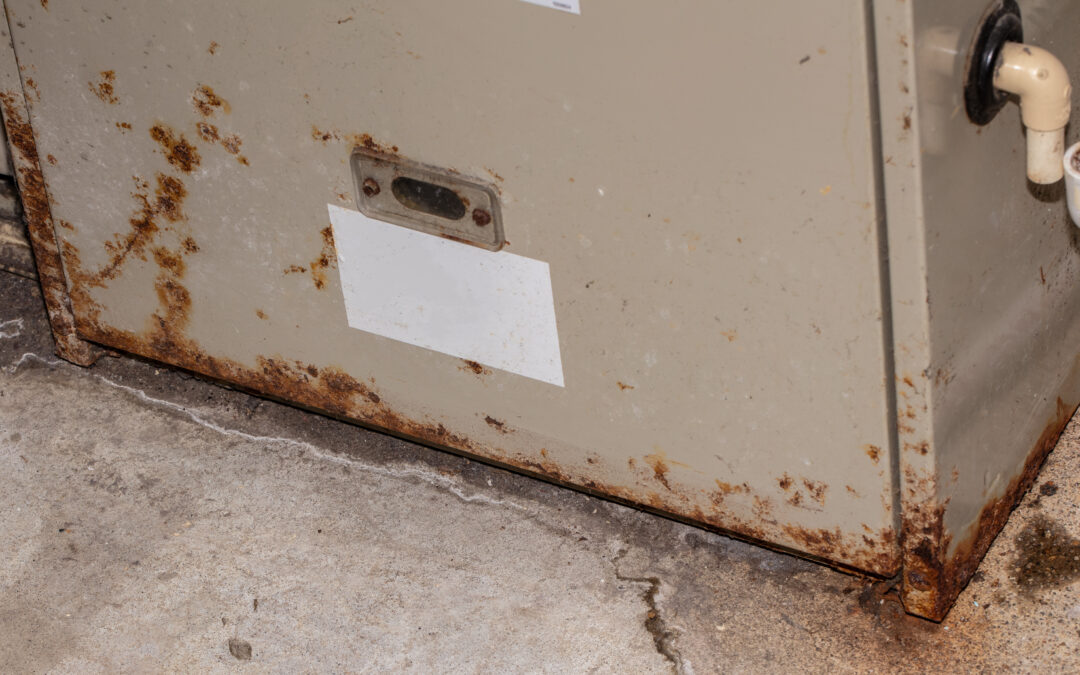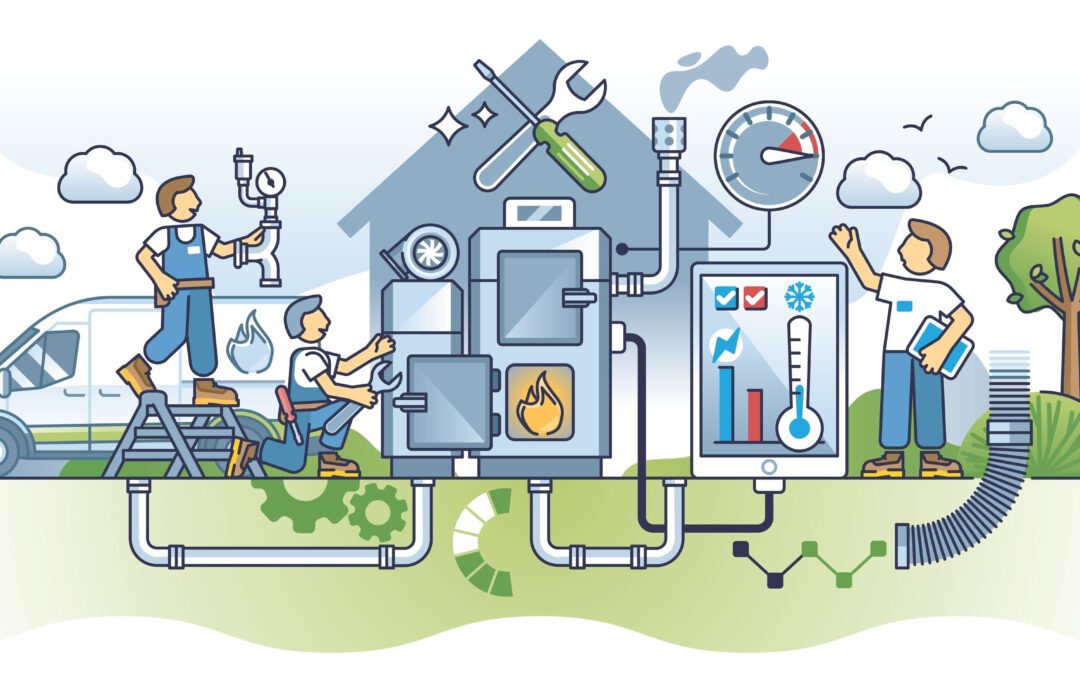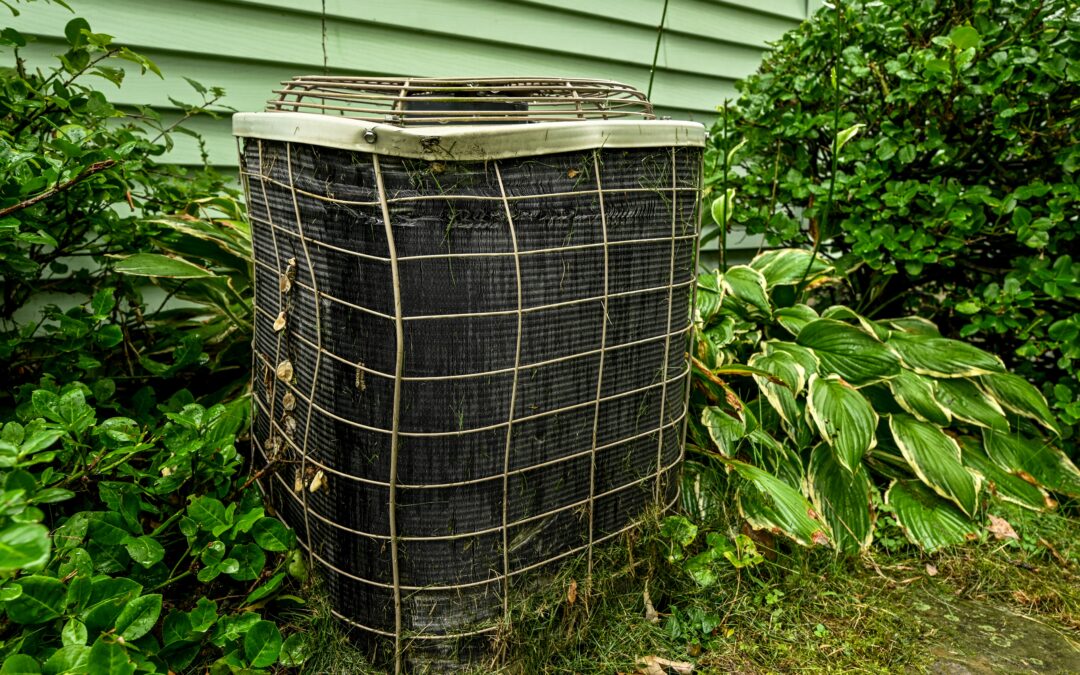
by Sabrina Cox | Nov 11, 2024 | Uncategorized
As Houstonians, we know how our winters work – cold for 3 days and then hot for a week. But during those 3 days of cold, we all rely on the furnace to keep us warm. And just like having your air conditioner checked in the spring, it’s just as important to have your furnace checked in the early fall to make sure it’s working correctly.
But then the annual furnace check slips to the bottom of the to-do list – which is easy since we don’t use the furnace very often. But it’s when we forget that things start to go wrong. So how do you know if your furnace is starting to go downhill? There are many signs that are visible to HVAC technicians, but to the average homeowner recognizing the more technical signs can be difficult. But not to worry because if you follow the advice listed below you will be able to understand your furnace almost as well as a licensed JW East Mechanical technician (well, not quite!).
According to the experts, the life of a furnace depends on what make and model you purchase and what type of warranty you have. Different parts of the furnace will have a different warranty and some will last longer than others. Heat exchangers usually have a 20-year warranty, but the blower and control boards have around a 5-year warranty. All this depends on usage and maintenance. Knowing when to replace your whole furnace or just some of its parts all depends on what is breaking down and the age of your furnace.
How do I know if my furnace isn’t working correctly?
If you make a point to pay attention to the age of your furnace and the way it responds when turning on and off, you will be able to detect certain signs that are indicators of it not working correctly. Your furnace might need replacement if:
You hear funny noises: When you turn your furnace on and off you can expect to hear some noise, but if you hear excessive rattling, popping, or banging coming from your unit, you have a problem. Noises are an indicator that your furnace or certain parts of it are about to give out. As soon as you hear these strange sounds it is important to call in a professional because the longer you wait, the more damage will be done to your furnace and other parts of your HVAC system.
You smell strange odors: A slight smell is to be expected when you turn on your furnace for the first time during the winter. But if the smell doesn’t go away and seems to get stronger as the days go by, there is an issue. Burnt smells, musky smells, and other off-putting odors are your furnace warning you that parts of it are not functioning properly. The problem might be with the blower or the motor, and the only way to tell is to have a licensed HVAC technician check it out.
Your furnace is old: Maybe you have had your furnace for over 10 years and have never had a major problem with it. However, just because you have never had a problem doesn’t mean you won’t, especially as it ages. As your furnace gets older its parts are no longer able to work as efficiently as they once did. And because of its age you might wake up one morning and find that your furnace completely stopped working while you were asleep. We recommend having your furnace checked out if it is older, even if you have had no problems. It is better to be safe and warm than to take the chance and be cold.
You notice higher bills: Different parts of your furnace use up different amounts of electricity. The blower motor and fan use up a lot, especially if they are about to break down. If you notice your electric bill is exceptionally high, the problem could be that these parts are about to go out and are pulling more amps than they should.
We understand there is a significant cost associated with replacing your entire heating system, but replacing your old and inefficient unit can actually save you money in the long run. With a new furnace you can expect:
Increased Energy Efficiency: Newer furnace models are designed to be more energy-efficient, often with higher AFUE (Annual Fuel Utilization Efficiency) ratings. This means they convert a larger percentage of fuel into usable heat, which can lower your energy bills.
Reduced Repair Costs: Older furnaces often require more frequent and costly repairs. By replacing an aging unit, you can reduce the likelihood of unexpected repair expenses and enjoy peace of mind.
Rebates and Incentives: Many utility companies and government programs offer rebates or incentives for upgrading to energy-efficient systems. This can offset some of the initial costs of the replacement.
Enhanced Indoor Air Quality: A new furnace often comes with an improved air filtration system that can reduce allergens and pollutants in your home. Better air quality can lead to fewer health issues, reducing healthcare costs.
Longer Lifespan: A new furnace typically has a longer lifespan (15-20 years) compared to an older unit. This means you won’t have to worry about replacing it again for many years, giving you stability in budgeting.
Smart Technology Integration: Many new furnaces feature smart technology that allows for programmable thermostats and remote monitoring. This can help you manage heating more efficiently, further reducing energy costs.
You might not be a professional HVAC technician, but if you know what to look for you can be aware of a potential problem before it becomes serious. If you notice any of the signs listed above, call a professional to come take a look. Our HVAC technicians are thoroughly trained to detect even the smallest problem and can help you decide if replacing your furnace is the best option for your household.

by Sabrina Cox | Oct 15, 2024 | Uncategorized
As winter (slowly) approaches, ensuring that your furnace is in optimal condition becomes essential for maintaining a warm and comfortable home. Understanding the various parts of your furnace and their functions will help you understand the importance of regular maintenance. Each component, from the heat exchanger to the blower motor, plays a crucial role in the efficiency and safety of your heating system. Neglecting these parts can lead to performance issues, higher energy bills, and safety hazards. Keep reading as we discuss the different components of your furnace, why they need to be maintained, and how keeping them in top shape can provide you with reliable heating when you really need it.
Before we talk maintenance, let’s discuss the most important parts of your furnace:
Furnace/Boiler: The main unit that generates heat. A furnace heats air, while a boiler heats water for radiators or baseboard heaters.
Thermostat: The device that allows you to set and control the desired temperature in your home.
Ductwork: These channels are located in your ceiling and walls to distribute heat throughout your home.
Vents and Registers: Openings that allow heated air to enter the living spaces from the ducts.
Heat Exchanger: In a furnace, this component transfers heat from the combustion gasses to the air circulating through your home while keeping combustion byproducts separate.
Air Filter: This removes dust, dirt, and allergens from the air before it is heated and distributed. Air filters require more maintenance than other heater components and should be changed several times a year, depending on usage.
Safety Controls: These include various sensors and shut-off valves designed to prevent overheating and ensure safe operation.
Pilot Light/Ignition System: For gas heating systems, this lights the burner. Some newer systems use electronic ignition.
Blower Motor: In forced-air systems, this motor helps circulate warm air through the ductwork and into your home.
Now that you know the most important components of your heating system, let’s address ongoing maintenance. If you want your heater to operate efficiently and safely, it’s important to perform regular maintenance on its components. We have outlined the most important components to focus on:
Air Filter:
- Frequency: Check monthly and replace or clean every 1 to 3 months.
- Importance: A clean filter ensures proper airflow and improves indoor air quality.
Blower Motor:
- Frequency: Inspect and clean annually.
- Importance: Dust and debris accumulation will slow the efficiency of the blower, causing it to work harder and will cost extra money on your monthly bills.
Heat Exchanger:
- Frequency: Inspect annually during professional maintenance.
- Importance: A clean heat exchanger optimizes efficiency and ensures no leaks occur.
Thermostat:
- Frequency: Test at the beginning of the heating season.
- Importance: Ensure it’s functioning correctly and consider upgrading to a programmable thermostat for efficiency.
Ductwork:
- Frequency: Inspect annually for leaks and blockages; clean every 3 to 5 years.
- Importance: Well-maintained ducts improve airflow and efficiency.
Pilot Light/Ignition System (for gas furnaces):
- Frequency: Inspect annually.
- Importance: Ensure the pilot light or electronic ignition works properly for safe heating.
Safety Controls:
- Frequency: Test annually during maintenance.
- Importance: These controls are crucial for safe operation; they help prevent overheating and other hazards.
Burners:
- Frequency: Clean and inspect during annual maintenance.
- Importance: Dirty burners can lead to inefficient combustion and affect performance.
Flue Pipe:
- Frequency: Inspect annually for obstructions or damage.
- Importance: Proper exhaust ensures safe removal of combustion gasses.
We recommend scheduling your fall HVAC heater inspection today if you have not already done so. Our experts are trained to recognize and fix any issue that your system might have. Plus, knowing your HVAC system has been tuned up for the fall will provide you with peace of mind all season long.

by Sabrina Cox | Sep 12, 2024 | Uncategorized
It’s almost here. You know, that time of year when we can finally stop running the air conditioner. Sure, we Houstonians appreciate a good AC unit, but after months and months of high bills and high heat we are all ready for a change. Pretty soon the AC will be off for good and in its place the heater will bring nice, warm air into our home. But before you turn on the heater for the first time, it’s important to have it checked out to make sure all its parts are working safely and correctly.
Annual checkups are vital to the efficiency of your heater and air conditioning unit. They should be done twice a year: in early spring for the AC unit, and in early fall for the heater. Doing so will help you spot and fix potential problems before they have a chance to get worse.
During a thorough fall HVAC check, a professional will look for the following:
Blockage in the vent or drainage system- The vent and drain are essential parts of your system. Your heater will perform at its best and last much longer with proper drainage and vent piping care by a qualified technician and will also lower your energy bill..
Accumulation of dust and debris- Over time, dust and other particles can get into your system and cause blockage and other damage. Also, airflow is compromised when dust gets in the way. A professional knows the right way to get around your system and clean it properly.
Rust and corrosion- If a part needs to be replaced, don’t wait to get it fixed before it does additional damage to your system. Metal can rust after not being properly cleaned and maintained for a long period of time, damaging important parts of your system.
Dirty flame sensors- If your flame sensors are dirty your burner cannot turn on, keeping your heater from producing heat. An experienced technician will properly clean the sensors so your system functions correctly.
Physical condition- Even though the individual parts of your system are working, the physical condition of the heater is important too. A technician should make sure that both the interior and exterior of your heater meets the highest standards.
Emission of dangerous, undetectable gasses- HVAC service technicians always check the carbon monoxide levels as well as other gasses in your system to ensure there are no leaks, which can be a threat to your health.
If that last one doesn’t raise any eyebrows, it should. Carbon monoxide can leak and go completely undetected for quite some time, leading to health problems or even death.
Deemed the Silent Killer, carbon monoxide is colorless and odorless, and kills on average 169 individuals a year according to the U.S. Consumer Product Safety Commission. In a recent study by the National Fire Protection Association, an estimated 72,000 non-fire carbon monoxide incidents were reported between 2015 and 2019. Of those, 94 percent occurred in a home.
A fall HVAC is important for many reasons. It will help you prepare for cooler weather, improve efficiency in your home, prevent breakdowns and will extend the lifespan of your system. Call the experts at JW East today to book your appointment for your fall HVAC checkup!

by Sabrina Cox | Aug 7, 2024 | Uncategorized
If hurricane Beryl taught us anything, it’s how much we depend on and appreciate our air conditioning. Summers are getting warmer and an efficient HVAC system is a must. Because of how important they are, it’s crucial to be aware of the signs that your air conditioning unit needs repair, because catching problems early can save you from costly repairs. From strange noises to inconsistent cooling, understanding these warning signs will help ensure that your home remains a cool refuge in our Houston heat. Continue reading as we discuss key indicators that it might be time to call in a professional.
Signs and Symptoms of a Failing HVAC System
Inconsistent Temperature:
Symptom: Different rooms have varying temperatures, or the system struggles to maintain the set temperature.
Fix: Check for blocked vents, dirty air filters, or issues with the thermostat.
Frequent Cycling:
Symptom: The HVAC system turns on and off more frequently than normal.
Fix: This could indicate an oversized system or a faulty thermostat. Have a professional assess the unit and possibly recalibrate the thermostat.
Strange Noises:
Symptom: Banging, clattering, or hissing sounds coming from the unit.
Fix: Loose components or debris can cause noises. Check for obvious issues and call for professional help if the noise continues.
Unpleasant Odors:
Symptom: Musty, burning, or chemical smells detected indoors.
Fix: Musty odors could suggest mold, while burning smells might indicate electrical problems. In these cases, it’s best to turn off the system and contact a technician immediately.
High Humidity Levels:
Symptom: Excessive humidity in the home, leading to discomfort and mold growth.
Fix: Check the air conditioner’s settings and ensure it is functioning correctly. If there’s an issue, consider using a dehumidifier or repairing the AC.
Water Leaks:
Symptom: Puddles of water around the HVAC unit.
Fix: This could indicate a clogged drain line or refrigerant leak. Check the drain pan and lines, and contact a professional if there are major leaks or refrigerant issues.
Increased Energy Bills:
Symptom: A sudden spike in energy bills without a change in usage.
Fix: This can signal inefficiency. Check and replace air filters, clean the coils, and ensure the unit is properly maintained. If the issue persists, get a professional evaluation.
Poor Air Quality:
Symptom: Increased dust in the home or respiratory issues among occupants.
Fix: Change air filters regularly and consider cleaning ducts. If problems continue, consult an HVAC technician for deeper cleaning or improvements.
As you can see from reading above, there are several ways you can try to fix HVAC problems on your own, but in most cases it is best to call in a professional. By recognizing symptoms of failure in your system, you are taking a step in the right direction to prolonging the life of your unit and saving money on monthly bills. If you do recognize anything from the list above, call the experts at J W East!

by Sabrina Cox | Jul 17, 2024 | Uncategorized
Hurricane Beryl caused significant damage to the greater Houston area, and a week later there are still many homes without power. Typically we do not get hurricanes this early in the season, which means that this season could be an active one. The delicate balance of an HVAC system’s components can be easily disrupted by the high winds, torrential rains, and power failures that accompany these powerful storms. Continue reading as we discuss common HVAC problems that happen during hurricanes and what you should do about it.
Some common issues that homeowners may face with their HVAC systems during a hurricane include:
Power Outages: Hurricanes can cause widespread power outages, leading to the HVAC system being unable to operate. Without electricity, heating and cooling systems will not function, impacting your comfort indoors.
Flooding: Heavy rains and flooding associated with hurricanes can damage the HVAC system, particularly outdoor units. Water exposure can lead to short circuits, corrosion, and other electrical issues that affect the system’s performance.
Debris Damage: High winds during a hurricane can cause debris like branches, leaves, or flying objects to impact the HVAC unit. This can result in physical damage to the equipment, affecting its functionality.
Ductwork Damage: Strong winds and flying debris can also damage or dislodge ductwork connected to the HVAC system. Damaged ducts can lead to air leaks, reducing the system’s efficiency and potentially causing indoor air quality issues.
Clogged Condenser Coils: After a hurricane, debris and dirt can accumulate on the outdoor condenser coils, obstructing airflow and reducing the system’s cooling capacity. Regular maintenance is necessary to clean and inspect the coils for optimal performance.
Refrigerant Leaks: Extreme weather conditions during a hurricane can result in refrigerant leaks from the HVAC system. Refrigerant leaks not only impact cooling efficiency but can also be harmful to the environment.
Now that we know what problems can occur, next we will explain what to do next when these issues happen in your home.
Power Failures:
- Check the circuit breaker panel to ensure the HVAC system is receiving power. Reset any tripped breakers if necessary.
- If the power failure is widespread, wait for the electricity to be restored before attempting to turn on the HVAC system.
Flooding:
- If the HVAC system has been exposed to water or flooding, do not attempt to turn it on. Contact a professional HVAC technician to inspect the system for damage.
- Remove any standing water around the outdoor unit to prevent further damage.
Debris Damage:
- Inspect the outdoor unit for any visible damage caused by debris. Remove any debris that may be obstructing airflow.
- If there is significant damage, contact an HVAC technician to assess and repair the unit.
Clogged Condenser Coils:
- After the storm has passed, clean the condenser coils if they are covered with debris. Use a soft brush or gentle water spray to remove dirt and debris.
- Ensure proper airflow around the outdoor unit by clearing any obstructions.
Refrigerant Leaks:
- If you suspect a refrigerant leak, do not attempt to fix it yourself. Contact a licensed HVAC technician to inspect the system and repair any leaks.
As you can see, most major issues that happen to your HVAC system should be inspected, diagnosed and fixed by a licensed HVAC technician. At JW East, we are a family-owned business serving the greater Houston area for more than 30 years. Our experience speaks for itself. If your home’s HVAC system is not working correctly after hurricane Beryl, give us a call today!





